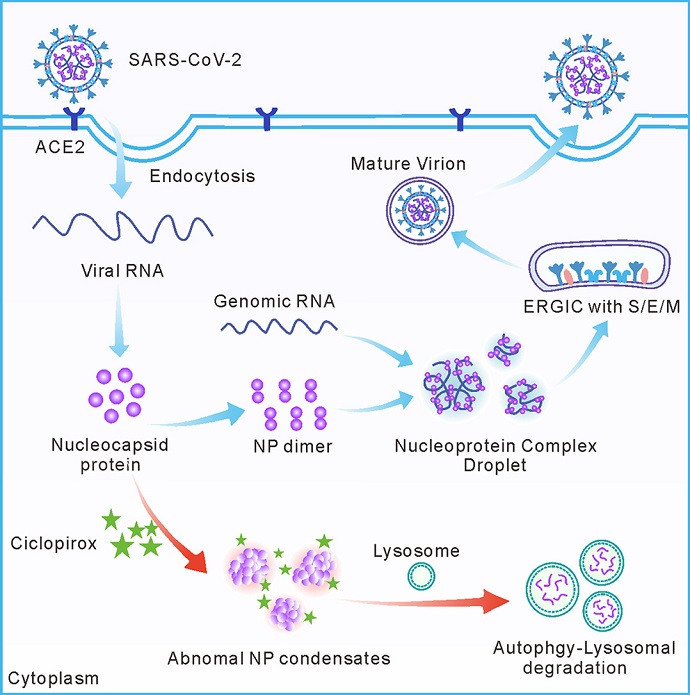Anti-Fungal Drug - Ciclopirox Inhibits SARS-CoV-2 By The Degradation Of The Nucleocapsid Protein
Nikhil Prasad Fact checked by:Thailand Medical News Team Mar 13, 2024 1 year, 1 month, 5 days, 32 minutes ago
COVID-19 News: The global fight against the coronavirus disease 2019 (COVID-19) caused by severe acute respiratory syndrome coronavirus 2 (SARS-CoV-2) has been ongoing for four years, with over 700 million reported cases and 7 million deaths. Despite the development of vaccines and drugs, the rapid mutation of the virus continues to pose a significant public health threat. To address this challenge, researchers from Southern University of Science and Technology in Shenzhen, China, Guangzhou Medical University, Guangzhou, China, and the First Affiliated Hospital of Guangzhou Medical University, China, embarked on a groundbreaking study that is covered in this
COVID-19 News report. This research focused on the nucleocapsid protein (NP), a crucial element in SARS-CoV-2 replication that has yet to be explored as a potential drug target.
 Graphical-Abstract - Ciclopirox Inhibits SARS-CoV-2 By The Degradation Of The Nucleocapsid Protein
Identifying the Need for New Targets
Graphical-Abstract - Ciclopirox Inhibits SARS-CoV-2 By The Degradation Of The Nucleocapsid Protein
Identifying the Need for New Targets
SARS-CoV-2 is a positive-sense RNA virus with a genome length of approximately 30 kb, encoding four structural proteins: spike, envelope, membrane, and nucleocapsid proteins. Among these, NP plays a vital role in viral replication, with its abundance and long half-life making it an attractive but unexplored target for drug development. Previous studies have highlighted NP's involvement in inflammatory responses, immune regulation, and the development of severe outcomes, making it a promising target for intervention. Despite various small molecular compounds targeting NP, none have been approved for clinical use due to structural dynamics hindering effective binding and NP's intricate association with viral RNA. This study aimed to overcome these challenges by identifying small molecules that promote NP degradation.
Ciclopirox Emerges as a Promising Candidate
In the search for compounds promoting NP degradation, researchers turned to an FDA-approved library and a drug-screening cell model. Among the compounds screened, ciclopirox, an antifungal agent with known anticancer and antiviral effects, stood out. Ciclopirox had previously demonstrated efficacy against various viruses, including HSV1, HSV2, HIV, and HBV. The study found that ciclopirox significantly inhibited SARS-CoV-2 replication both in vitro and in vivo by inducing abnormal NP aggregation and subsequent degradation through the autophagy-lysosomal pathway.
Understanding Ciclopirox's Mechanism of Action
To unravel the mechanism behind ciclopirox-induced NP degradation, the researchers engineered a cell model and conducted various assays. They found that ciclopirox indirectly interacted with NP, disrupting its thermal stability and inducing abnormal condensates with higher viscosity and lower mobility. These condensates were subsequently degraded through the autophagy-lysosomal pathway, resulting in a shortened NP half-life and reduced expression. Importantly, ciclopirox's specificity was confirmed, as it only affected NP expression without impacting other structural and non-structural pro
teins.
Ciclopirox's Impact on SARS-CoV-2 Replication
The researchers assessed ciclopirox's antiviral potency in three different cell lines, revealing its ability to significantly inhibit SARS-CoV-2 replication. Ciclopirox's impact on viral RNA, protein levels, and various SARS-CoV-2 indicators was confirmed through RT-qPCR and Western blotting. Importantly, ciclopirox's efficacy was observed in inhibiting different SARS-CoV-2 variants, suggesting its potential as a broad-spectrum inhibitor.
In Vivo Efficacy of Ciclopirox
To validate the in vitro findings, an animal assay was conducted using a BALB/C-hACE2 mouse model. Ciclopirox treatment not only reduced viral titers and gene expression in lung tissues but also ameliorated lung pathology. The treated mice exhibited improved vitality and body weight compared to the control group. Additionally, ciclopirox's anti-inflammatory ability was demonstrated through reduced cytokine and pro-inflammatory factor expression in lung tissues.
Conclusion and Future Directions
In conclusion, ciclopirox emerges as a promising candidate for inhibiting SARS-CoV-2 replication by targeting NP degradation. This study provides valuable insights into the mechanism of ciclopirox's action and its potential as a dual-function drug with antiviral and anti-inflammatory effects. While the study offers a foundation for controlling the COVID-19 pandemic, further research is warranted to identify intermediate proteins mediating ciclopirox-NP interaction and assess its effectiveness against other coronaviruses. Overall, ciclopirox presents a significant step forward in the ongoing battle against COVID-19 and potential future viral pandemics.
Medical Disclaimer: This article is based on research findings and for information purposes only and does not constitute medical advice of any kind. Please do not attempt to self-prescribe or consume any mentioned drugs as it can possibly lead to life-threatening situations. Always consult a licensed medical doctor before attempting to consume any drugs and should you suspect you have COVID-19, see a doctor immediately or go to the nearest hospital.
The study findings were published in the peer reviewed journal: Acta Pharmaceutica Sinica B.
https://www.sciencedirect.com/science/article/pii/S221138352400090X
For the latest
COVID-19 News, keep on logging to Thailand Medical News.
